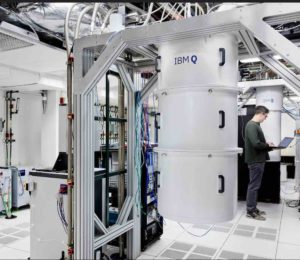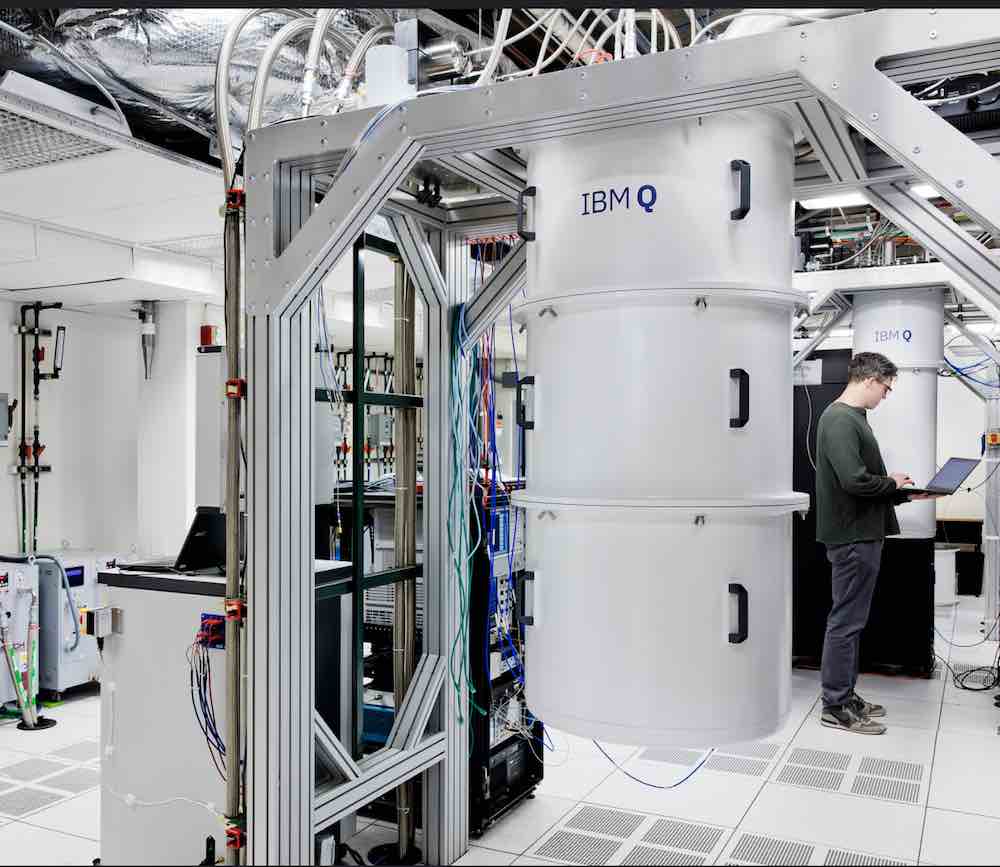 Today IBM announced the first clients to tap into its IBM Q early-access commercial quantum computing systems to explore practical applications important to business and science. In all, twelve initial organizations joined to foster a growing quantum computing ecosystem based on IBM’s open source quantum software and developer tools.
Today IBM announced the first clients to tap into its IBM Q early-access commercial quantum computing systems to explore practical applications important to business and science. In all, twelve initial organizations joined to foster a growing quantum computing ecosystem based on IBM’s open source quantum software and developer tools.
IBM sees the next few years as the dawn of the commercial quantum era – a formative period when quantum computing technology and its early use cases develop rapidly. The IBM Q Network will serve as a vehicle to make quantum computing more accessible to businesses and organizations through access to the most advanced IBM Q systems and quantum ecosystem,” said Dario Gil, vice president of AI and IBM Q, IBM Research. “Working closely with our clients, together we can begin to explore the ways big and small quantum computing can address previously unsolvable problems applicable to industries such as financial services, automotive or chemistry. There will be a shared focus on discovering areas of quantum advantage that may lead to commercial, intellectual and societal benefit in the future.”
The IBM Q Network provides organizations with quantum expertise and resources, and cloud-based access to the most advanced and scalable universal quantum computing systems available, starting with a 20 qubit IBM Q system. IBM also recently built and measured the first working 50 qubit prototype processor. IBM anticipates that access to this prototype will be offered to IBM Q Network participants in the next generation IBM Q system.
Organizations will work directly with IBM scientists and engineers to pioneer quantum computing for specific industries and have direct cloud-based access to IBM Q systems. Each of the IBM Q Network Partners below will explore a broad set of potential applications of quantum computing in their industry that could provide a quantum advantage – demonstrations of real-world problems that can be solved faster or more efficiently with a quantum computer than with a classical computer.
- JPMorgan Chase will be the premier global financial services partner with IBM, focusing on use cases for quantum computing applicable to the financial industry including trading strategies, portfolio optimization, asset pricing, and risk analysis.
- Daimler AG will work with IBM to advance the potential use cases of quantum computing for the automotive and transportation industry. Some areas of research include finding and developing new materials for automotive application through quantum chemistry, complex optimization problems such as for manufacturing processes or vehicle routing for fleet logistics or autonomous/self-driving cars, and the intersection of quantum and machine learning to enhance the capabilities of artificial intelligence.
- Samsung, working closely with IBM, will explore a variety of use cases where quantum computing may impact the future of the semiconductor and electronics industry.
- JSR Corporation, a leading chemical and materials company, will explore how quantum computing can improve materials for electronics, environmental and energy applications.
As a leader in financial services technology, JPMorgan Chase is excited to collaborate with IBM Research in exploring how quantum computing may impact the industry,” said Lori Beer, CIO, JPMorgan Chase. “Joining the IBM Q Network allows us to bring our technologists alongside IBM’s researchers and leverage cutting-edge quantum systems to learn about how we may be able to apply these technologies in the future.”
Also, IBM Q Network Members Barclays, Hitachi Metals, Honda and Nagase will build their knowledge of general approaches to quantum computing and begin to investigate potential use cases for their industries of finance, materials, automotive and chemistry respectively.
IBM is also introducing IBM Q Consulting, which brings together consultants, scientists and industry experts to help clients realize new business value through the application of quantum computing technology, and deliver customized roadmaps to help them become quantum ready. With access to cutting edge mathematics and engineering, IBM’s quantum computing developers are applying their expertise to address complex business problems and discover new use cases in industries such as mining, banking and electronics.
IBM Q Network Establishes Global Hubs for Quantum Research, Education and Broader Industrial Collaboration
IBM is establishing five regional hubs across four continents to increase access to quantum systems and advance research, which are critical for accelerated learning, skills development and implementation of quantum computing. These IBM Q Network Hubs will broadly enable their industry and research collaborators to have online use of IBM Q Systems and engage in joint development work to explore quantum computing. The hubs will be located at IBM Research in the United States, Keio University in Japan, Oak Ridge National Labin the United States, Oxford University in the United Kingdom, and the University of Melbourne in Australia.
IBM is already working with MIT to explore the intersection of quantum computing and machine learning as part of the MIT-IBM Watson AI Lab. Together, IBM and MIT scientists are investigating the “Physics of AI”, which involves new research into AI hardware materials, devices, and architectures. Focus areas include using AI to help characterize and improve quantum devices, and researching the use of quantum computing to optimize and speed up machine-learning algorithms and other AI applications.
Providing access to real quantum computing hardware is fundamental to accelerating the development of applications and programs important to UT-Battelle, LLC., the managing and operating contractor at the Department of Energy’s Oak Ridge National Laboratory (ORNL),” said Jeff Nichols, Associate Laboratory Director, Oak Ridge National Laboratory. “Establishing ORNL as a hub of the IBM Q Network would again demonstrate that UT-Battelle is at the forefront of innovation, enabled by the world’s most advanced computational systems, and will continue to drive transformational advancements in science and research.”
IBM Fosters Growing Quantum Ecosystem
Through the publicly available IBM Q Experience, over 60,000 users have run more than 1.7M quantum experiments and generated over 35 third-party research publications using the world’s first series of quantum computers available openly on the web. The IBM Q Experience enables registered users to connect to IBM’s quantum processors via the IBM Cloud, to run algorithms and experiments, work with the individual quantum bits, and explore tutorials and simulations around what might be possible with quantum computing.
Enabling high quality academic research is one of the core principles of the IBM Q Experience, and now registered academic users can leverage the IBM Q Experience for a deeper research collaboration. Professors and researchers will find customized tools that will accelerate and differentiate their work including preferred queue access to IBM’s quantum processors, the ability to link and tag their research to the IBM Q Experience, and channels to request new features and functionalities. Users have registered from over 1500 universities, 300 high schools, and 300 private institutions worldwide, many of whom are accessing the IBM Q Experience as part of their formal education.
IBM Research is announcing a series of prizes for professors, lecturers and students who use the IBM Q Experience and QISKitin the classroom or for their research. Awards will be made available for developing course materials for a lecture series; building Jupyter Notebook tutorials with QISKit; contributing specific code modules to the QISKit SDK and to students or postdocs who publish a scientific paper that makes use of QISKit. Selected submissions will be contributed to open source.
Sign up for our insideHPC Newsletter




